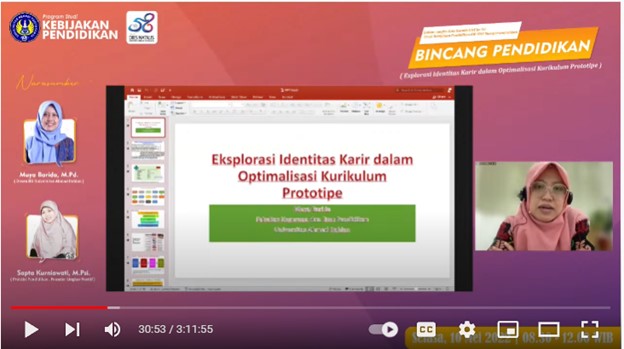You are here
Career Identity Exploration in Prototype Curriculum Optimization

curriculum is nothing new in the world. The development of the world must be followed, so that the prototype curriculum follows the paradigm shift of life. This prototype curriculum facilitates freedom in learning, according to the needs of students, according to what is desired, interested or who feels the student is capable. This prototype curriculum is great for realizing high competitive human resources because students are not required to learn a lot of things, but just superficial. This curriculum provides facilities for students to learn something that is in accordance with their abilities and interests. Thus the introduction delivered by Muya Barida, M.Pd., as one of the speakers from the Education Talk with the Topic of Career Identity Exploration in Optimization Curriculum organized by the UNY FIP Education Policy Study Program, Tuesday (10/5).
Furthermore, Freedom determines students ' interests and desires in learning is good for students, but for students who experience confusion in determining interest due to lack of understanding. , stimulus, association, learning, then understanding is needed related to career identity. Muya explained that the career is a combination and sequence of roles played by a person during his life. "In Super theory with the concept of Life Span Development: The Career Rainbow explained that there are 4 career stages, namely, the age stage of 0-14 years at the growth stage, at this stage. Children do not have a strong career identity, new children learn to know a variety of careers. Age Stage 15-25 exploration (Exploration), Teenagers have been looking for, confused with him, have appeared a commitment to a career later. At the age of 26-45 establishment, have found and made a career in it. At the age of 46-65 maintenance, continue to improve until retirement. At the age of 65 and above, withdrawal" he explained.
This stage of career development determines not only from within itself but from the influence of the environment (job market), the historical situation of socio-economic, personal determinants. "In addition, we must look at Ginzberg's career development theory, children aged 0-11 years in fantasy times, children need adult figures to be used as models, so that he can identify a suitable career for himself. The age of 17- to 25-year-olds is realistic, going from subjective to realistic. At this time the teenager has begun to think realistically, can already determine a career that is suitable for him. In childhood tentative age 11-16 years children in the period of intersisi between fantasy period with realistic time, at this time the child still focuses on his abilities. Suppose the child likes mathematics, then he chooses a career as an accountant. After this transition period is over, children will focus on realistic things," he explained.
Muya also reminded, if only directing children to their desires whether the subjects, the interest is whether it can lead children to their ideals. Therefore , Muya also emphasized one theory of Holland's career, that a job or job selection is the result of the interaction between the factors of seismicity with all influences. culture, friends, parents, and adults who are considered to have an important role.
At the end of the session, Muya suggested exploring the potential of student peseta by conducting interest inventory activities, measuring psychological scales, questionnaires, and conducting aptitude tests and tests. interest. "The prototype curriculum will be successful if there is support. Preparation for how to hold screenings, what is their potential, we can develop. We cannot leave career responsibilities only to students, but teachers, communities, social environments, and relationships. I am optimistic that the prototype curriculum, can provide rainbow colors, which shines a light on the future of our learners," he concluded.
This Education Talk was held in the framework of the 58th Anniversary of Yogyakarta State University online Zoom Meeting as well as live streaming on the FIP UNY Official channel and the Education Policy Study Program channel. This Education talk activity was attended by 243 participants from lecturers and tendik elements of the Faculty of Education, teachers in education units from various regions in Indonesia. (Ririt)

Contact Us
- Address : Colombo Street No 1, Karangmalang Yogyakarta 55281
- Telp : (0274) 540611
- Fax : (0274) 540611
- Email : humas_fipp@uny.ac.id,
- Website: http://fipp.uny.ac.id
- Facebook FIPP UNY
- Instagram FIPP UNY
- Youtube Channel
- Tiktok
Copyright © 2025,
